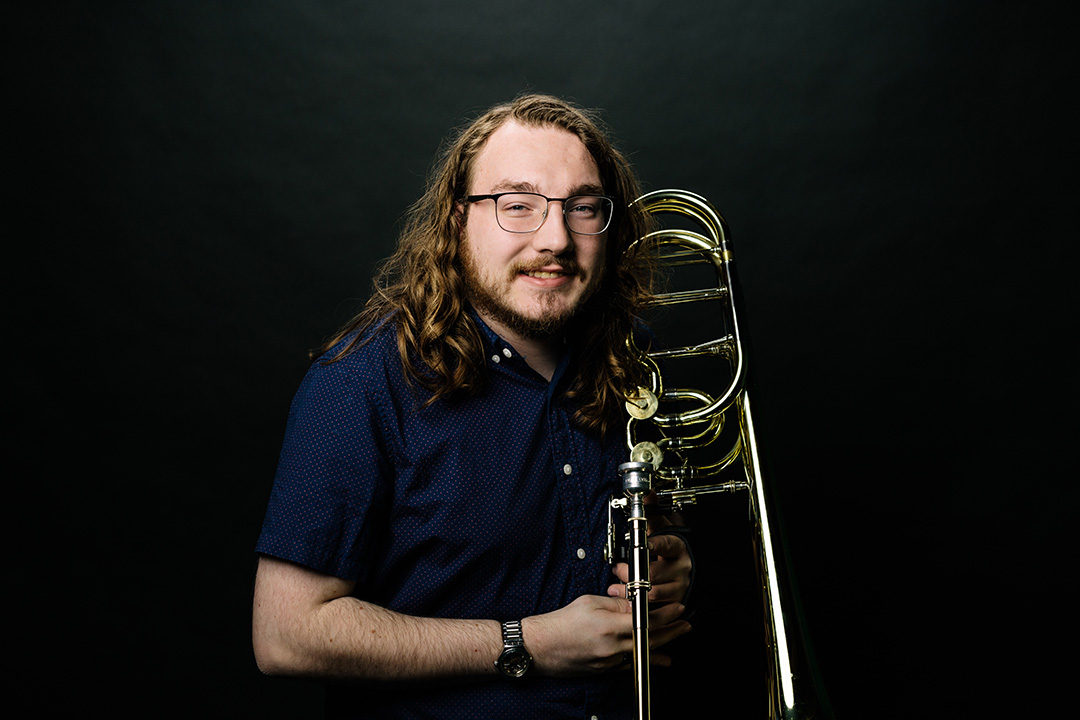
USask student composer merges music and nature
Through a summer research project at the University of Saskatchewan (USask), undergraduate student Spencer Krips (BMUS'19) opened his ears to aspects of nature he hadn’t considered before.<br/><br/>
By Chris PutnamKrips—a musician, composer and future teacher—researched and wrote music in the field of ecomusicology, a study area that connects music with environmental concerns.
“We never really think about the soundscape as integral and important. We see the smoke that we put into the air, but we don't think about what are putting into it from the auditory side and how that affects so many different things in nature,” Krips said.
Krips completed a Bachelor of Music (Honours) degree from USask’s College of Arts and Science in 2019 and is now a student in the College of Education’s Sequential Music Program.
Earlier this year, he accepted a summer job at the Prairie Habitat Garden, a teaching and learning garden operated by the College of Education on the USask campus. In addition to caring for the plants of the garden, he was asked to conduct his own student research project.
Krips’ supervisor Dr. Janet McVittie (PhD), an assistant professor of educational foundations in the College of Education, suggested he explore ecomusicology with his project.
Krips had never heard of ecomusicology, but was intrigued by the opportunity to write music “with a specific meaning or purpose behind it,” he said.
“At first when I started learning about ecomusicology, I assumed what most people assume, which is that it’s just music that has to do with the environment. But then through all the readings I realized, oh, there’s a lot more to it.”
Krips first started composing music when he was a student in the Department of Music. As he studied ecomusicology this summer, he began to see new musical possibilities.
He would spend half his day tending to the garden and half at home reading ecomusicology literature. He soon began writing music that related to what he learned.
“I’d be working in the garden, and I’d be like, ‘Oh, I can hear the birds really clearly right now. So I’d stop, pull out my phone, and just record them,” Krips said.
He had to learn a “very different mindset” than he was used to as a composer. Writing music in sync with nature forced him to fully listen and engage with the sounds around him.
“Once I started framing it through reacting and responding, (the music) came out really interesting. And things that I normally wouldn't try to write or want to write worked wonderfully,” Krips said.
Krips wrote music that incorporated and drew attention to natural sounds, as well as music that addressed environmental issues through lyrics. He worked with other students and alumni of the Department of Music to bring his compositions to life.
For a track called “(Mostly) Magpies,” Krips wrote fragments of music to accompany the sounds of magpies in the Prairie Habitat Garden. He enlisted his brother Fraser to perform the piece on marimba, inviting him to improvise within the fragments as though the birds were fellow musicians in a live performance.
The goal of the piece was to draw listeners’ attention to the natural soundscape, including the sounds of magpies—a bird that many consider a noisy pest.
“The biggest thing I found when I was working in the garden is you really notice when they're there and when they're not there. And you notice how much the modern progression we have with machines and cars and all these things completely destroys that,” said Krips.
Krips collaborated remotely with other student musicians on “what counts as silence,” a song that speaks directly to the issue of noise pollution. In his lyrics, Krips writes that silence in the modern age is simply “the presence of noises / slightly less loud.”
Krips presented his research, including several of his original compositions, at the USask Student Undergraduate Research Experience (SURE) Symposium in August. His presentation won second place at the event.
When Krips completes his Bachelor of Education and becomes a music teacher, he “will bring into the classroom a rich understanding of what music is,” said McVittie. “Spencer will soon be teaching young people to express their love for the natural world in musical ways.”
In the meantime, Krips plans to keep writing music.
“I’m hoping to do more stuff within this vein. I find writing music within this context was actually really exciting and freeing and calming,” he said.
Article re-posted on .
View original article.

